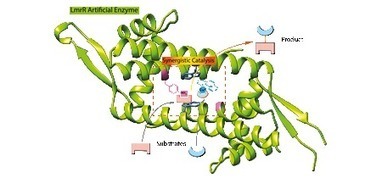Scientists at the University of Groningen turned a non-enzymatic protein into a new, artificial enzyme by adding two abiological catalytic components
Follow, research and publish the best content
Get Started for FREE
Sign up with Facebook Sign up with X
I don't have a Facebook or a X account
Already have an account: Login
 Your new post is loading... Your new post is loading...
 Your new post is loading... Your new post is loading...
|











University of Groningen scientists created a new enzyme that can catalyse (speed up) an important reaction in organic chemistry. They added a copper complex to a protein that had no enzymatic properties. Next, they inserted an unnatural amino acid into the protein. Together with the copper, a side chain of the amino acid was able to catalyse the required reaction. The method to add unnatural groups to a protein could be used to design many other new enzymes. These could replace standard chemical catalysis and thereby contribute to making chemistry cleaner and more energy efficient.